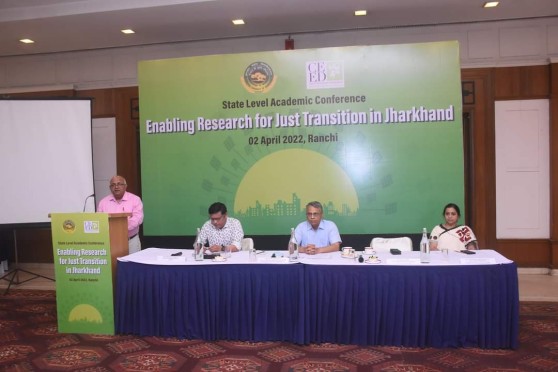Academic institutions pledge to facilitate research on Just Transition


The Central University of Jharkhand (CUJ) and the Centre for Environment and Energy Development (CEED) organised a state-level academic conference in Ranchi to encourage localised research on diverse themes of just energy transition in Jharkhand by actively engaging academic institutions and universities of the state.
Academics from Ranchi University, Birla Institute of Technology, Mesra; Vinoba Bhave University, Hazaribagh; Xavier Institute of Social Service, Ranchi; Nilambar Pitambar University, Palamu; Amity University, Ranchi; spoke about diverse research themes at the conference.
The collaborative research is aimed at adding to the body of knowledge on Just Transition and contributing to informed public policy discussion benefitting diverse stakeholders for a future-ready economy in the state.
The idea of Just Transition was officially included in the framework of the Paris Agreement (2015) and Katowice summit (2018) under the United Nations Framework Convention on Climate Change (UNFCCC). In the COP-26 meeting held in Glasgow (2021), India pledged commitment to cut emission to net zero by 2070.
Net-zero, or becoming carbon neutral is indeed a bigger goal, where energy transition will play a key role. In fact, Just Transition in India cannot be materialised until it is facilitated at the sub-national level, particularly in states like Jharkhand.
“The whole world is shifting the narrative around challenges and opportunities around Just Transition in local perspectives, though there has been very limited research contextualised in states like Jharkhand. Considering an immense scope of inter-disciplinary research and development activities unfolding, a collaborative engagement with institutions will be helpful for bringing out much needed studies & insights on pressing issues,” said Ramapati Kumar, the CEO of CEED.
CEED has started a Just Transition Resource Centre engaged in research, enabling policy, knowledge sharing, and capacitation of stakeholders at the sub-national level.
Addressing the conference, the director of Centre for Excellence in Green Energy and Efficient Technology at CUJ, S.K. Samdarshi, said: “The current development paradigm based on fossil fuel is poised to be changed in favour of cleaner and renewable sources, where energy transition in states like Jharkhand will immensely contribute to bringing socio-economic transformation. As there is immense scope of research ideas on cleaner solutions, it can facilitate a new way of thinking, skillset and approaches and will facilitate a forward-looking economy putting sustainability and a low carbon future at the centre-stage.”
Endorsing the initiative, Bijay Singh, head of the Geology department at Ranchi University, said: “Academic communities have a larger role to play as knowledge dissemination is key to wider public deliberation and policy-related discussion. As an overarching idea, Just Energy Transition has enormous appeal to a variety of academics, social scientists, anthropologists, sociologists, public policy experts, environmentalists, and energy researchers, etc. Academic institutions will get exposure to new themes and areas that are relevant, contemporary and resonate with the ideals of inclusive development.”
In the open session of the conference, participant institutions also deliberated on the current status and the way forward for interdisciplinary research.
The conference presented several key research themes in a solution-driven approach such as restructuring and diversification of economy, identification of emerging sectors, ecosystem restoration in mine-dominated regions, digitalisation and technology as enabler for transition, assessment of multidimensional impact of gender in just transition process, identifying alternative livelihood opportunities for weaker sections and sustainable climate resilient measures for the affected regions. The conference also saw participation of representatives of key research think-tanks — World Resource Institute, ISEP, Swaniti initiatives, SwicthON Foundation — who also shared their insights and pledged support to facilitate collaborative research and studies process further.